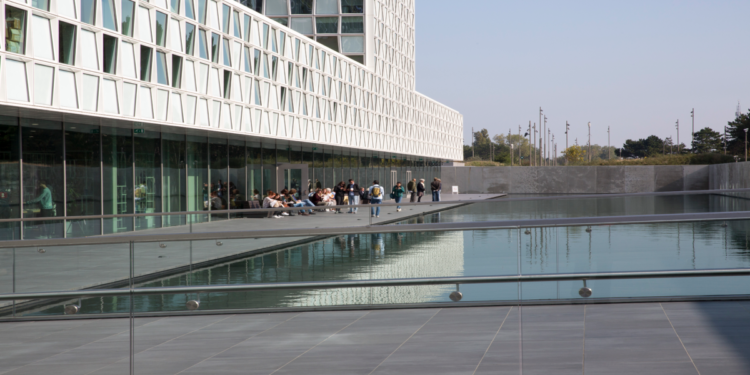By Thomas Verfuss
Law students in 65 teams, a record number, from five continents converged in The Hague on Sunday for this year’s moot court competition at Leiden University, one of the most respected universities in the world for international criminal law matters. During the contest at the university’s Hague campus they will “play ICC” in the coming days. In a mock trial they will represent prosecution, defence and victims in a fictitious case about slave labour. A record number of 200 judges will hear their presentations. The final round will take place at the ICC itself.
At the opening, the International Bar Association announced that a few scholarships had been issued to enable good law students from Africa to come to The Hague, an expensive city, for the occasion — scholarships to the benefit of students from countries like The Gambia, which is now recovering from years of authoritarian rule. But still, the representative of Journalists For Justice (JFJ) in the auditorium with hundreds of students had to turn his head quite a bit to spot the few black faces.
Under-representation of Africans at international courts has been a problem for decades. Today’s interns may be judges in 20 or 30 years. But there are few African interns at the ICC because interns are not paid. For students from the European Union, it is relatively easy to obtain an Erasmus grant to study in another EU country, so there are many European interns at the international courts in The Hague, who can lay foundations for their international law career there.
The EU had scholarships in The Hague for excellent African law students to work for a couple of months at the ICC. They have been abolished. An ICC judge JFJ spoke to informally said he is angry about this. He said he now tends to get applications only from the rich elite in the African countries that can afford to stay in The Hague, but does not necessarily produce the best law students.
The official opening of the moot court was the premiere of a documentary on Ben Ferencz, the “last surviving Nuremberg prosecutor”, as he is often described. During the Nuremberg trials after the Second World War, the allied powers tried the main surviving culprits of the Hitler regime. Ferencz, 98 years old now, was the chief prosecution attorney in the trial against the leaders of the Nazi “Einsatzgruppen” that killed hundreds of thousands of Jews and other civilians in Eastern Europe during the war.
After his Nuremberg assignment, Ferencz started a decades-long campaign for the establishment of an international criminal court. He travelled countless times to The Hague for lobbying purposes once the first contemporaneous international court, the UN Criminal Tribunal for the former Yugoslavia, had been established in 1993. Ferencz would approach unsuspecting visiting law students in the ICTY lobby and ask them: “What do you want — law or war?”
He was invited to give the opening speech at the Rome conference in 1998, where the ICC founding treaty was negotiated, and then ICC chief prosecutor Luis Moreno Ocampo asked Ferencz to speak during the closing arguments in the case against Thomas Lubanga, the first ever ICC trial.
Ferencz got several standing ovations during the Hague event.







